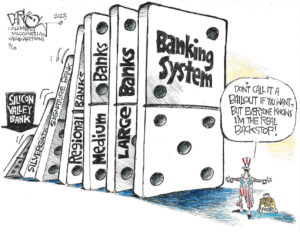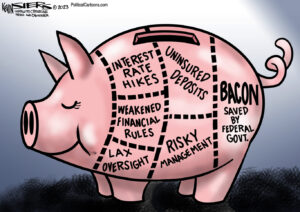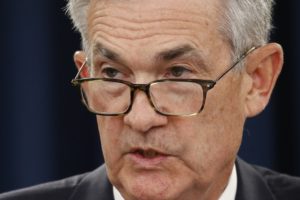The Real Stars of the Debate
In the second presidential debate, the questioners seemed to understand better than either candidate that we are in the midst of a national emergency as grave and possibly more far-reaching than the terrorist attacks of Sept. 11, 2001.The voice of the people is an imperfect trumpet.
It is heard most loudly through the angry squawk box of talk radio. Increasingly in this age of political pamphleteering through electronic postings, it can be vitriolic and downright vulgar — as much so on the left as on the right.
Most recently, the voice of the people came through in the primal scream of opposition to the $700-billion bailout of Wall Street, dooming the first attempt by the House of Representatives to pass the measure and, it now seems apparent, helping to fan the uncertainty that has contributed to a worldwide contagion of financial fear.
When a presidential debate takes the form of a town hall meeting, with questions posed to the tightly scripted candidates by members of the public, we are never quite able to predict the outcome. In the second debate between Democrat Barack Obama and Republican John McCain, neither emerged a clear rhetorical victor — a draw that benefits Obama, who entered leading in most polls. His smooth performance is likely to keep him there.
But the stars of this show were the public questioners. They seemed — more than either candidate — to understand that we are in the midst of a national emergency as grave and possibly more far-reaching than the terrorist attacks of Sept. 11, 2001.
It is unsurprising that as Americans have seen their home values plummet, their incomes stagnate and their retirement savings evaporate, questions about the economy would dominate. What was more unexpected — and far more disappointing — is that neither candidate jettisoned the old-think of his own campaign rhetoric. Dutifully Reagan-esque optimism and promises made long before the financial tsunami washed over the political landscape were the bromides of the night.
Following up on a question from Oliver Clark, who’d asked what the bailout would do to “actually help” those people who are experiencing financial difficulties, moderator Tom Brokaw tried hard to get the candidates to throw away the talking points: “Are you saying to Mr. Clark and to the other members of the American television audience that the American economy is going to get much worse before it gets better, and they ought to be prepared for that?”
It would have been nice for one of the candidates to acknowledge what is commonly discussed in the grocery checkout line, which is, of course, that things are going to get much worse before they get better. We know that housing prices probably haven’t hit bottom, that more layoffs are coming as companies try to cope with lost business, and that a deep and possibly terrifying contraction is the almost certain result of the virtual shutdown in consumer spending.
Honesty, however, was deemed not to be the best debate policy. “No, I am confident about the American economy,” said Obama, in an obvious attempt to avoid the gloom-and-doom Democrat label. McCain was a tad more realistic: “I think it depends on what we do.”
Yes, it depends on what we do. But once the election is won, rallying a demoralized public to swallow some distasteful economic medicine is going to be crucial. Neither candidate moved toward this sort of presidential conduct. It was striking that neither abandoned a single campaign pledge to cut taxes or increase spending, though it is clear that all promises must be reconsidered, if not abandoned, in light of drastically changed circumstances.
Most telling were their responses to a 78-year-old woman from Chicago, who pointedly said: “Since World War II, we have never been asked to sacrifice anything to help our country, except the blood of our heroic men and women. As president, what sacrifices — sacrifices will you ask every American to make to help restore the American dream and to get out of the economic morass that we’re now in?”
For McCain, the answer is to cut “some programs,” but none he specified. For Obama, it is to “start thinking about how we can save energy in our homes,” as if we haven’t been thinking about that already. Obama also said he would double the size of the Peace Corps, an admirable goal that is utterly beside the economic point.
It is often said that the American voter is easily manipulated, prone to cast a ballot in an undisciplined act of emotion. Yet given the chance to ask questions that might provoke a display of leadership, the public met the moment. The candidates, unfortunately, did not.
Marie Cocco’s e-mail address is mariecocco(at)washpost.com.
© 2008, Washington Post Writers Group
Your support matters…Independent journalism is under threat and overshadowed by heavily funded mainstream media.
You can help level the playing field. Become a member.
Your tax-deductible contribution keeps us digging beneath the headlines to give you thought-provoking, investigative reporting and analysis that unearths what's really happening- without compromise.
Give today to support our courageous, independent journalists.




You need to be a supporter to comment.
There are currently no responses to this article.
Be the first to respond.